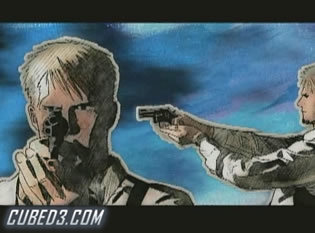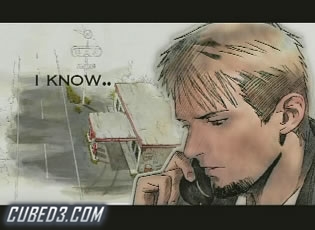Hotel Dusk: Room 215 (Nintendo DS) Review
By Adam Riley  19.03.2007
19.03.2007
When the Nintendo DS hit the streets with its touch-screen controls, the immediate out-cry was that it looked perfectly suited for the adventure genre that had predominantly resided in the world of Personal Computers thanks to the point and click interface working perfectly with a mouse. However, other than a port of the first Gyakuten Saiban from the GBA (aka Phoenix Wright), the only other release was Another Code from Japanese team Cing, which used the system in so many clever and devious ways. Now the same team is back with its second DS game, Hotel Dusk: Room 215. Can the magic found before be built upon this time round? Let us find out...
You are Kyle Hyde, ex-officer of the law turned salesman peddling wares to folks across the country. Life has been hard on you since handing in your badge and hitting the rocky road life seems to have dealt you, and as a result you do not give a damn about anyone or anything. Hard-edged through and through, only the determination to find your ex-partner Bradley and seek enlightenment as to why he betrayed the force and his closest friend keep you waking up each morning. After years of hitting road block after road block, you stumble across a dingy accommodation called Hotel Dusk, expecting your stay to be as downbeat as the place itself. But little do you know there is far more to it than meets the eye...
In Another Code the graphical approach was to have a top-down viewpoint on the lower DS screen, where the stylus controlled the main character, whilst the top switched between highly detailed static images at the appropriate times. This may have worked quite well, but Cing has devised an even better approach for Hotel Dusk. The first thing to note is that the DS is held just like during Brain Training, in other words on its side like a book. Part of this is to make it seem like you are playing an interactive book, but it also lets the character art be expanded to fill the screen more, which is definitely good news considering the fantastic style employed. All characters are like black-and-white sketches of people, except they constantly active to give them a mesmerising animated quality. As everyone and his dog has previously stated, it appears just like the style used in that age-old A-ha video for Take On Me. In addition, the taller view gives better perspective for the 3D navigation of the hotel itself - as you control the game on the plan view image on the right screen, the hotel is portrayed in all its polygonal glory on the left. It can look a little grainy and pixellated at times, but it is a vast improvement over Another Code.

Following the gritty, stylised approach taken with the visual side, Hotel Dusk's soundtrack is suitably downbeat, moody and yet equally intense and light-hearted, piecing together the right mix of music for whichever situation you are faced with. Difficult situations, normally the ones where you could face a 'Game Over', are made even more tense thanks to the fast-paced beat in the background, and then other synth-based tunes are laid back, just like the blasé mood of Kyle Hyde himself as he mooches around the joint in his trademarked detective-like trench coat. Everything related to setting the right atmosphere is in place and definitely adds to the whole experience in a very positive manner.
Which sets it all up nicely for the main meat of the game! So you hold the DS on its side for the whole adventure, moving Hyde around by using the stylus on a top-down plan of an area of the hotel whilst a first-person viewpoint is shown on the left screen. Depending where he is in the hotel, sometimes he will run, other times the pace is more of a ‘meander’, which can grate at times. But for the most part the approach works fine. At the bottom of the right screen is you menu list, which lets you open a memo book, open the main menu, look at / interact with doors, observe things or talk to people. The main menu offers the chance to save and load, plus look at a summary of your items collected so far or a check on the characters met along the way. As for the note pad, this nice little feature comes in handy at times as you can jot down by writing with the stylus thoughts, ideas or reminders (if you are turning the game off for a long while) throughout the game, plus other characters will give Hyde information he will automatically store in there.

As for when you approach a door, simply click on the door icon and you zoom into it and can either knock by tapping the door itself, try the handle or use an item on it if you believe it will help. A similar approach is taken with people, except it is click on the 'talk' icon or use an item to show them. Conversations are integral to the game and are normally the primary route to a Game Over if you choose the wrong options. As you start to uncover the mysteries behind Hotel Dusk you begin to find your detective instincts coming alive, but must prevent others from becoming suspicious of your activities or line of questioning - examples being the hotel owner, Dunning, and maid Rosa early on, since they MAY think you are a reporter if too many blunt questions are asked.
So gathering clues and taking the right route with your questioning is vital throughout and later on you will need to come to a crux by pushing certain shady characters so much that they break, but of course if you do not have enough evidence to back yourself up or knowledge to answer their retorts, then again it will be Game Over - there are lots of dead ends in Hotel Dusk and alternative paths to take (plus a ‘New Game +’ option after the credits roll), stopping the game from falling into the hand-leading category that proves frustrating with adventure romps at times. However, there is a rather small annoyance in that you will sometimes know exactly what you need to do long before the game actually lets you. For instance, early on you have the means to cut a wire you will need later, but have to wait until you find another cutting device before said wire can be acquired…Again, a minor niggle, but one nonetheless.

Puzzles themselves are hit and miss, but all prove to be good enough to keep your interest at all times. They range from the simplest ones like moving jigsaw pieces into the correct places and finding hidden items in certain rooms to cleverer ones like figuring out how to flip a picture onto its front to see a message on the back, working out how to read a worn away engraving on a pen or trying to re-start an electric generator. Cing has worked very hard to create a better product than Another Code and has certainly succeeded, but there are just a few issues here and there - a couple of minor points already mentioned, plus the fact that a lot of Another Code can be found in Hotel Dusk. Whilst the similarities issue is not a major problem this time, if the template is not shaken up more for future games, boredom for fans of Cing’s previous games could set in.
For those wondering if the game is anywhere near as long as the latest Phoenix Wright, Justice for All, then you will be pleased to know that whilst it may not stretch out quite as much, it holds its own much better than the extremely brief Another Code. None of the puzzles will leave you scratching your head, though, which is somewhat of a shame after coming from playing Broken Sword 4 on the PC, but there is enough of an interesting storyline and plenty of character development throughout to make it worth trying every possibility in order to learn more. Again, though, there is the missed opportunity of comical responses from trying crazy stuff (something even Touch Detective includes to some degree!), and it is minor niggles such as these that prevent Hotel Dusk from becoming the classic it strives to be. Still, it definitely is a major step forward for Cing and adventure gaming on the DS in general.

Cubed3 Rating
Great - Silver Award

You may look at this and wonder why Another Code scored higher overall, but it all comes down to competition. At the time Cing's first adventure outing had the playing field to its self, and was a marvel to play through. Now, however, there are more games pushing the envelope and making scoring tougher. Today Another Code would probably receive a 7 as Hotel Dusk is definitely a much stronger game overall, proving that Cing is a vital asset to Nintendo. DS owners should definitely track this down as it complements Phoenix Wright perfectly...
Comments
Comments are currently disabled

 Sign In
Sign In Game Details
Game Details
 Out now
Out now  Out now
Out now  Out now
Out now  Out now
Out now  Subscribe to this topic
Subscribe to this topic Features
Features






 Top
Top

